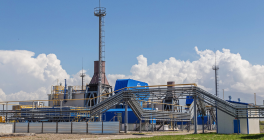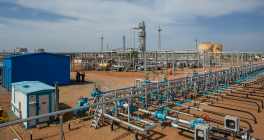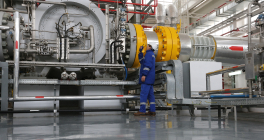Environmental responsibility

Environmental responsibility
Environmental responsibility is a critical element of the Company’s sustainable development strategy. Environmental protection (EP) is regulated by the Environmental Policy, which reflects the Company’s commitment to the principles of sustainable development. The document defines the main obligations of the Company - to guarantee compliance with environmental standards and requirements established by the legislation of the Republic of Kazakhstan, international legal acts in the field of environmental protection; ensure reduction of negative environmental impact (NEI); pursue policies aimed at resource conservation; take all possible measures to preserve the climate, biodiversity and compensate for possible damage to the environment and a number of other obligations.
Natural gas, due to its environmental benefits, plays an important role in achieving the UN Sustainable Development Goals and the Paris Climate Agreement, providing a contribution to the low-carbon development of the Kazakhstan economy.
The company pays close attention to improving energy efficiency, reducing air emissions, reducing the generation and disposal of production and consumption waste, and restoring land and biodiversity.
When implementing investment projects, the Company is aware of the degree of its responsibility for maintaining environmental balance. Work is carried out in several areas: modern technological solutions are used to minimize the impact of production activities on the natural environment, continuous environmental monitoring is carried out, and programs are implemented to preserve biodiversity in the Company’s area of responsibility.
Support for environmental projects
- The Company’s Youth Council held an “Eco-Subbotnik” campaign in the mountains of Almaty.
Eco-friendly and inexpensive gas instead of diesel
The National Gas Company believes that the development of infrastructure for the sale of gas motor fuel (compressed natural gas (CNG) and liquefied natural gas (LNG) will help reduce the shortage of diesel fuel in Kazakhstan.
For comparison: diesel fuel consumption in Kazakhstan, according to the Ministry of Energy of the Republic of Kazakhstan, is about 5.5 million tons per year. While in neighboring Uzbekistan, with a population twice the population of Kazakhstan, diesel fuel consumption is three times less. This difference is due to the active development of the gas motor fuel market in Uzbekistan. The number of automobile gas filling compressor stations (CNG filling stations) in Uzbekistan is 80 times greater than in Kazakhstan, and amounts to 1,440 units versus 18 units in Kazakhstan.
At the same time, the cost of gas motor fuel in comparison with diesel fuel is 138 tenge/m3, versus 295 tenge/l (1 liter of diesel fuel corresponds to 1,14 m3 of natural gas).
QazaqGaz plans to increase the number of CNG filling stations in Kazakhstan to 32 units, build one plant for the production of liquefied natural gas and conduct negotiations on expanding the bus fleet using natural gas engine fuel.
In turn, achieving the target indicators will increase the number of jobs in the industry to 273, and in related areas to 1000.
To further stimulate the gas motor fuel market, QazaqGaz plans to unite cities where there are already CNG filling stations by constructing stationary and mobile CNG filling stations on the main international and national routes. These include the Western Europe – Western China route, the Beineu-Uralsk route and the Astana-Almaty route. Even in the case of an optimistic scenario, if 50% of diesel fuel demand is replaced with methane, 3.76 billion m3 will be required, which will be only 19% of the total gas consumption in Kazakhstan.
Currently, QazaqGaz is setting the trend for the further development of the CNG filling station network and attracting international transit using gas motor fuel. Thus, the transition of international and intercity transportation to gas engine fuel will significantly reduce transportation costs due to the low cost of fuel compared to diesel. In turn, this will affect the final price of transported goods. In the future, the construction of a network of CNG filling stations on the highways of Kazakhstan will make it possible to transfer agricultural machinery, large quarry equipment, railway, river and sea transport to gas motor fuel.
In addition to the economic effect, replacing diesel fuel with gas motor fuel will reduce the amount of harmful emissions into the atmosphere:
carbon dioxide - by 20%, soot - by 99%.







